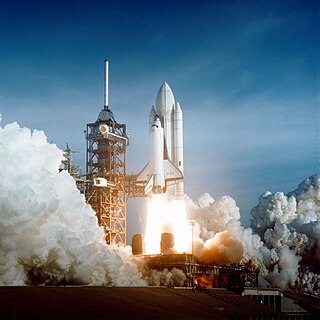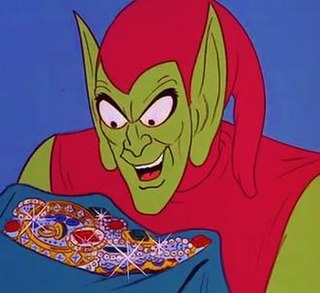Related Research Articles

A solid-propellant rocket or solid rocket is a rocket with a rocket engine that uses solid propellants (fuel/oxidizer). The earliest rockets were solid-fuel rockets powered by gunpowder; The inception of gunpowder rockets in warfare can be credited to ancient Chinese ingenuity, and in the 13th century, the Mongols played a pivotal role in facilitating their westward adoption.

A model rocket is a small rocket designed to reach low altitudes and be recovered by a variety of means.

A scale model is a physical model which is geometrically similar to an object. Scale models are generally smaller than large prototypes such as vehicles, buildings, or people; but may be larger than small prototypes such as anatomical structures or subatomic particles. Models built to the same scale as the prototype are called mockups.
Hydroxyl-terminated polybutadiene (HTPB) is an oligomer of butadiene terminated at each end with a hydroxyl functional group. It reacts with isocyanates to form polyurethane polymers.

The Jetex motor is a miniature solid-fuel rocket motor produced for use as a powerplant for flying model aircraft. Its production led to a number of imitators and, after its discontinuation, successors of similar type.

Revell GmbH is an American-origin manufacturer of plastic scale models, currently based in Bünde, Germany. The original Revell company merged with Monogram in 1986, becoming "Revell-Monogram". The business operated until 2007, when American Revell was purchased by Hobbico, while the German subsidiary "Revell Plastics GmbH" had separated from the American firm in 2006 until Hobbico purchased it in 2012, bringing the two back together again under the same company umbrella. After the Hobbico demise in 2018, Quantum Capital Partners (QCP) acquired Revell.

High-power rocketry is a hobby similar to model rocketry. The major difference is that higher impulse range motors are used. The National Fire Protection Association (NFPA) definition of a high-power rocket is one that has a total weight of more than 1,500 grams (3.3 lb) and contains a motor or motors containing more than 125 grams (4.4 oz) of propellant and/or rated at more than 160 Newton-seconds of total impulse, or that uses a motor with an average thrust of 80 newtons (18 lbf) or more.
Motors for model rockets and high-powered rockets are classified by total impulse into a set of letter-designated ranges, from ⅛A up to O. The total impulse is the integral of the thrust over burn time.
Orville H. Carlisle, a shoe salesman in Norfolk, Nebraska invented the hobby that would become known as model rocketry.
Amateur rocketry, sometimes known as experimental rocketry or amateur experimental rocketry, is a hobby in which participants experiment with fuels and make their own rocket motors, launching a wide variety of types and sizes of rockets. Amateur rocketeers have been responsible for significant research into hybrid rocket motors, and have built and flown a variety of solid, liquid, and hybrid propellant motors.

North Coast Rocketry was a model rocket company founded in 1983 in Cleveland, Ohio by Chris Pearson and Matt Steele. Dan Kafun added as a partner in 1989.

Oscorp, also known as Oscorp Industries, is a fictional multibillion-dollar multinational corporation appearing in American comic books published by Marvel Comics, predominantly in stories about Spider-Man. The company was founded by Norman Osborn and has appeared in numerous media adaptations. It first appeared in The Amazing Spider-Man #37 and was created by Stan Lee and Steve Ditko.

Marvel Entertainment, LLC was an American entertainment company founded in June 1998 and based in New York City, formed by the merger of Marvel Entertainment Group and Toy Biz. The company has been a wholly owned subsidiary of The Walt Disney Company since 2009, and was mainly known for consumer products, licensing, and comic books by Marvel Comics, as well as its early forays into films and television/streaming shows, including those within the Marvel Cinematic Universe (MCU).
A pyrotechnic composition is a substance or mixture of substances designed to produce an effect by heat, light, sound, gas/smoke or a combination of these, as a result of non-detonative self-sustaining exothermic chemical reactions. Pyrotechnic substances do not rely on oxygen from external sources to sustain the reaction.
Ammonium perchlorate composite propellant (APCP) is a solid-propellant rocket fuel. It differs from many traditional solid rocket propellants such as black powder or zinc-sulfur, not only in chemical composition and overall performance but also by being cast into shape, as opposed to powder pressing as with black powder. This provides manufacturing regularity and repeatability, which are necessary requirements for use in the aerospace industry.

The Green Goblin, a supervillain in Marvel Comics and an archenemy of the superhero Spider-Man, has been adapted in various forms of media, including films, television series, and video games.

Toy Biz, Inc. was a toy manufacturer, originally founded in Montreal, Quebec as Charan Toys. The company is best known for holding the Marvel Comics toy license from 1990 to 2006.

Rocket propellant is the reaction mass of a rocket. This reaction mass is ejected at the highest achievable velocity from a rocket engine to produce thrust. The energy required can either come from the propellants themselves, as with a chemical rocket, or from an external source, as with ion engines.
A black powder rocket motor propels a model rocket using black powder. Black powder rocket propellants consist of charcoal, sulfur, and potassium nitrate. Adjustments can be made to the amount of each component to change the rate at which the black powder burns.

P120 is a solid-fuel first-stage rocket motor developed by Avio and ArianeGroup through the joint venture Europropulsion on behalf of European Space Agency for use on Vega C and Ariane 6.
References
- ↑ "Toy Biz, Inc. -- Company History". fundinguniverse.com. Retrieved 12 April 2011.
- ↑ "NARCON 2011 Presentations". NARCON. Washington Aerospace Club. Archived from the original on 14 May 2011. Retrieved 10 May 2011.